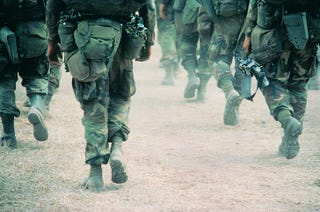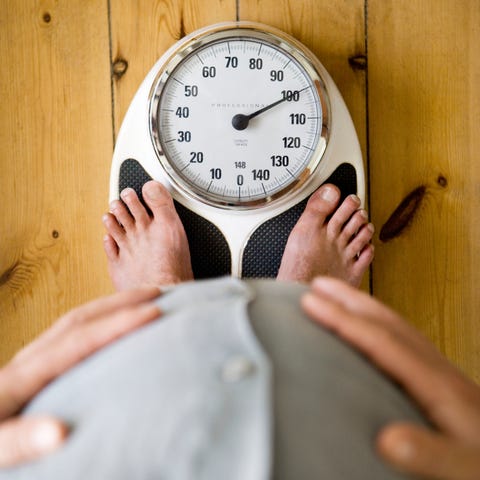
Most dieters have one simple goal: to lose as much weight as possible, in as short a time frame as possible. So it’s no wonder why the so-called “Military Diet” is so popular.
According to the website TheMilitaryDiet.com, the Military Diet is a weight loss plan that could help you drop as much as 10 pounds in one week. If that promise wasn’t alluring enough, the website claims you can do this without exercise, and ice cream is included as a nightly treat.
So what’s up with this mysterious diet? Where does it come from, and is it at all legit? Here’s what you should know.
Getty Images
What is the Military Diet?
According to the website, the Military Diet requires you eat specific foods for breakfast, lunch, and dinner over the course of three days. The meal plan is extremely calorie-restrictive: on the first day, for instance, you can only eat roughly 1078 calories. (For comparison, the average, moderately active male needs roughly 2400 to 2600 calories per day.)
After the initial three-day period, you can eat whatever you want for the next four days, as long as you don’t consume more than 1500 calories. If you do this for a whole month, you can lose up to 30 pounds, according to the website.
So what do you eat on the Military Diet? Here’s a sample plan.
Breakfast
Lunch
Dinner
Getty Images
Why is it called the Military Diet?
Honestly? We don’t know. While TheMilitaryDiet.com offers plenty of information, including a section with frequently asked questions, blog, and alternative meal plans for vegetarians, there are no authors, experts, or webpage owners listed. And while the name implies a military connection, the page doesn’t actually claim any ties to the armed forces. (MensHealth.com reached out to the website for more information and will update if and when we hear back.)
We do know, however, that the Military Diet has previously gone by other names, such as the Cleveland Clinic diet, the Mayo Clinic diet, the Kaiser diet, and the Birmingham Hospital diet. According to CNN.com, none of these organizations have actually endorsed the diet.
We also know that the Military Diet is not associated with the armed forces in any way, says Roland Paquette, PA-C, an assistant professor in physician assistant studies at UT Health San Antonio. A former Green Beret who served in the United States Special Forces from 2004 to 2006, Paquette tells MensHealth.com that the army did not institute a specific diet to get cadets into shape.
“I pretty much ate everything that was available, because you’re so active all the time,” Paquette says. He adds that pancakes, French toast, and biscuits and gravy were common breakfast menu items — none of which are on the Military Diet.
Maj. Carla Gleason, a spokeswoman for the Pentagon, confirmed this. She told MensHealth.com that the United States Department of Defense does not endorse any meal or diet plan outside of what’s listed in its Warfighter Nutrition Plan, a guide that was developed to meet the nutritional needs of service members.
Is the military diet safe or healthy?
In the short term, following a diet as calorie-restrictive as the Military Diet likely won’t do much harm. But you’ll definitely be hungry, and you may experience dizziness, headaches, and fatigue, especially if you’re working out while on the diet.
According to Paquette, the Military Diet does have one advantage over other weight loss plans: unlike other diets like Keto, which tend to eliminate entire food groups, the military diet includes a mix of protein, carbohydrates, and fats, albeit in tiny amounts. But he says the guidelines for the diet are simply too general to be considered healthy. For instance, breakfast on the first day simply lists “toast,” without specifying whether it’s whole-wheat or white.
“It’s hard to say exactly looking at the foods whether they’re good for you or not,” he says.
Getty Images
Can you really lose 10 pounds in one week?
The military diet could help you lose weight, but probably not 10 pounds— and definitely won’t help you keep it off long-term. Most of it is likely to be water weight, according to our experts.
Kristen Kizer, a registered dietitian at Houston Methodist Hospital, says that while the Military Diet website claims that the specific foods you eat on the diet can help you “burn fat,” that’s just not the case.
“The Military Diet has ‘fad diet’ written all over it, claiming special food combinations can help you lose weight and allowing for unhealthy fake foods, like hot dogs and one cup of ice cream,” she says.
Most health professionals advise only losing one to two pounds per week, and “even this can be challenging” for some people, says Kizer. Weight loss depends on such a wide range of factors, from genetics to body weight, that it’s impossible to make the claim that one diet will help everyone lose a certain amount of weight in a given time frame.
Even if you do lose a few pounds, it’ll probably water weight that will be regained, Kizer adds. Plus, as is the case with yo-yo dieting and fasting in general, a “feast-or-famine cycle can have negative long-term effects on your metabolism,” she explains, making it easier for you to regain the weight you’ve lost.
“The Military Diet has ‘fad diet’ written all over it.”
What’s the right way to lose weight?
As any successful dieter or medical professional can tell you, slimming down takes time.”Weight loss is a long-term game,” Paquette says.
Dr. Holly Lofton, director of the medical weight management program at NYU Langone Health, recommends people start by keeping a food journal to monitor average daily caloric intake. Then look at where you can make easy changes: for example, by cutting three slices of bread at dinner down to two.
It’s best to start slowly by removing empty calories from processed foods, snacks, and beverages, she advises. And of course, a healthy diet should include plenty of vegetables, high-fiber fruits and protein.
Simply put: low-calorie diets like the Military Diet may help you shed a pound or two in the short-term, but they’ll never give you long-lasting results.
“We’ve learned almost any fad diet will help you lose weight, but the regain rate is high,” says Kizer. “No one likes to hear it, but small, realistic changes done by the whole family with good social support is still the best way to make lasting change.”
At the end of the day, both Paquette and Kizer agree that the Military Diet probably does more harm than good.
“Do I think it could be detrimental to the millions of Americans who already have an unhealthy relationship with food?,” says Kizer. “Yes.”
Source: Read Full Article


